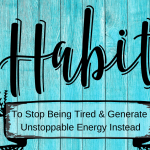 How tired are you? Are you reading this post while you swig caffeine after a sleepless night with your smartphone inches away from your head, glowing in the night and alerting you to every post and comment made on social media? Did you wake up to a to-do list overloaded with expectations and a family with more going on than the Kardashians?
How tired are you? Are you reading this post while you swig caffeine after a sleepless night with your smartphone inches away from your head, glowing in the night and alerting you to every post and comment made on social media? Did you wake up to a to-do list overloaded with expectations and a family with more going on than the Kardashians?
It’s no wonder we are so exhausted. We live in a time where we have more expectations and more to do than any previous generation. Most of the things that were designed to make our lives more efficient and our quality of life superior to that of the past are causing us to deteriorate mentally, physically, and socially. So much for the modern era of being able to do and have it all.
We are about to spend the next 30 days looking at burnout: what causes it, how to prevent it, and how to rejuvenate if we have pushed ourselves past prevention. Each day you will receive a new opportunity to better understand what burnout is, as well as the effects it has on our minds, bodies, and the entire family.
Understanding the physical aspects of burnout- How sleep, overwhelm, stress, and exercise all play an important part in causing, avoiding, or recovering from burnout in our lives. You’ll learn some of the culprits you may not realize are stealing your peace and your health. I’ll show you how to get rid of them, or at the very least, reduce their impact.
Learn to read the signs and symptoms of burnout and fatigue- There are tell-tale signs all around that point to your level of burnout and fatigue. You’ll better understand how your lifestyle may be contributing to your chronic fatigue and sense of burnout. Then, you can consider my suggestions to start making changes that will simplify your life and make burnout less likely.
Discovering alternative behaviors to improve health- Burnout can be avoided, and you can recover from its effects. I will share pro-tips and important ideas that will get you firing on all cylinders.
Over the course of a month’s time, you will start to feel rejuvenated and more in control of your environment and family life. Look forward to feeling better, sleeping better, and feeling in control and purposeful in your day-to-day life. I can’t wait to get started sharing this information and helping you see the results in your life that you deserve!
Are You Getting Enough Sleep?
How do you feel about the quantity and quality of your sleep? If you are fighting fatigue and burnout, one of the first evaluations you should make begins in your bedroom. The quantity and quality of restful sleep you are experiencing is directly related to your ability to manage stress.
Sleep is our body’s time to repair and rejuvenate itself from the damage accrued in day-to-day life. How we sleep is as important as our actual need to sleep. Being able to sleep in a safe and comfortable environment, free from distractions, is key to nurturing meaningful rest periods.
Here are three ‘thieves’ that rob you of quality sleep:
Inconsistent bedtimes- Do the demands of your day dictate when you go to sleep and what time you wake up? Working until the wee hours of the night and getting up before dawn aren’t best practice for your wellbeing. Setting a designated bedtime and sticking to it will encourage you to stay focused and finish your work in the times you are awake. Pareto’s principle states that the time it takes us to complete a task expands or contracts to fit the time we have decided to give ourselves to finish. In this case, giving yourself a specific bedtime will ensure that what you need to get done will happen in the time prior to your bedtime. Consistency in your bedtime routine will improve your stamina and help avoid burnout.
Smartphones and devices- Smartphones, televisions, iPads, and computers are all designed to help make our work easier and entertainment more accessible. The truth is, these things have no place in your bedroom. Science is proving that screen time before bed is detrimental to your quality and quantity of sleep, and the time for intimacy that you may be missing with your spouse. Consider making your bedroom a screen-free zone and a sacred space for rejuvenation and connection.
Anxiety and worry- The connection between poor sleep and anxiety may seem like a “chicken and egg” scenario. Does lack of sleep lead to anxiety, or does anxiety cause lack of sleep? No matter the cause, anxiety is a thief of quality sleep. Getting serious about tackling whatever trouble may be happening in your life that is causing you to be anxious will help you find rest in the bedroom.
Here are three ways to improve your sleep quality:
Evening rituals- Your body is set to a rhythm. You are working in sync with calendars, clocks, and other routines that create the rhythm of your life. Your evening rituals can enhance these rhythms and get you ready for a great night’s sleep. Begin with an evening routine that is consistent, and promotes peace and harmony in your home. After work, take some time to reconnect with your spouse, help kids with homework, and prepare for the next day. Pack backpacks and place them by the door. Verify what you need to be ready for the next day and get organized. Eat a healthy dinner at the table with your family and engage together in meaningful conversation. Limit television and computer usage. Make distinctive transitions between mealtime and bedtime prep: including showers, brushing of teeth, bedtime stories, etc. Remind your kids as it nears time for each transition. Being consistent and predictable in your evening routine will reduce conflict and improve the quantity and quality of your whole family’s sleep.
Soothing and comfortable environments- One of the best indicators of the quality and quantity of your sleep is the state of your bedroom itself. From the temperature of the room to the thread count of your sheets, the details matter. Having an environment that is free of distractions such as noise, light, or too few or too many blankets makes all the difference when it comes to your sleep. Create an environment that promotes comfort and calm, and your sleep quality will improve dramatically.
Exercise and eating well- Believe it or not, what you eat and how you exercise affects your sleep. Eating foods that are high in salt or too spicy for your digestive system during the day can affect your ability to stay in a deep sleep. Eating food too close to bedtime can also affect your quality of sleep. Drinking too much water and having to wake up multiple times to use the bathroom can break your cycle of restorative sleep and leave you feeling tired and worn-out. Exercise is a key contributor to high-quality sleep. Cardio and muscle training are excellent ways to ensure you sleep deeper and harder. Even those with anxiety report that working out helps them fight insomnia that worrying causes. Schedule workouts multiple days per week to increase your quality of sleep.
Sleep is a key factor in both preventing and recovering from burnout. Getting your family into an evening routine and your sleep environment ready for bed will help you optimize your sleeping time and have you feeling refreshed and ready for the next day.
The Importance of Down Time
Do you put a lot of value on outcomes and achievements? If you do, you may have a difficult time understanding the benefits of down time. High achievers tend toward seeing down time as being too unproductive, or a literal “waste of time.” I assure you, it’s not. In fact, it is a requirement to avoid burnout and fatigue. Here’s why:
- Down time rejuvenates you
- Down time allows your brain to rest
- Down time frees up space for creativity
- Down time lets you connect with your family
- Down time helps prevent depression
- Down time offers you some perspective
Down time is designed to get you out of the fast lane of life and onto the country back road. Down time allows you to experience the things you work so hard for, such as your family, your hobbies, your environment, and expressing your true self. Each day that you are working or focused on responsibilities, you can’t fully be in the moment with those you are working for: yourself and your family. What’s the point of all that work if you never let yourself experience the fruit of it?
In some cultures, down time is built into the structure of society. Whether through fasting, honoring the sabbath, or engaging in a tradition that requires them to shift their focus away from their career and toward their family and faith. Even in modern secular society, most employment requires a limit on hours worked in a day or days worked in a row. This is to prevent exhaustion and burnout.
Whether you prefer down time to be daily, weekly, monthly, or annually; you should build it into your life as a way to disconnect from what you think matters most and reconnect with what really does matter most.
Here are some ways to build down time into your life:
✓30 minutes of prayer or journaling
✓30 minutes of reading
✓Exercise
✓Meditation
✓One-on-one time with family
Weekly-
✓Massage
✓Date night
✓Family game night
✓Sunday dinner
✓Church
✓Naps
Monthly-
✓Host or attend a dinner with friends
✓Volunteer in your community
✓Engage in a social activity outside your home
✓Go to a movie
✓Complete an art or hobby project
Annually-
✓Host or attend a family reunion
✓Take a vacation
✓Take a “stay-cation”
✓Go on a mission trip
✓Engage in a sporting event
How you engage in your down time isn’t as important as the fact that you need to do it to avoid burnout. Most of all, your example will teach others that it is important to engage in down time to prevent their own fatigue and deterioration of their quality of life. Pick your favorite forms of down time and watch your personal satisfaction increase while your fatigue diminishes.





Leave a Reply